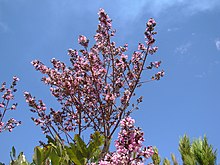Vatairea
| Vatairea | |
|---|---|

| |
| Vatairea macrocarpa | |
| Scientific classification | |
| Kingdom: | Plantae |
| Clade: | Tracheophytes |
| Clade: | Angiosperms |
| Clade: | Eudicots |
| Clade: | Rosids |
| Order: | Fabales |
| Family: | Fabaceae |
| Subfamily: | Faboideae |
| Clade: | Vataireoids |
| Genus: | Vatairea Aubl. |
| Species[1][2][3] | |
| |
Vatairea is a genus of flowering plants in the legume family, Fabaceae. It includes eight species of tall trees native to the tropical Americas, ranging from southern Mexico to Bolivia and southern Brazil. Seven species are native to northern South America, with the center of diversity in Amazonia. Vatairea lundellii ranges from southern Mexico to Panama. Most species grow in tropical rain forest, often in the inundated forests known as igapó and varzea, where they are emergent trees, growing above the forest canopy. V. macrocarpa grows in seasonally-dry forest, cerrado (savanna and woodland), and caatinga (scrub forest).[1]
It belongs to the subfamily Faboideae. It was traditionally assigned to the tribe Dalbergieae, mainly on the basis of flower morphology;[4] recent molecular phylogenetic analyses assigned Vatairea into an informal, monophyletic clade called the "vataireoids".[5][6]
References
[edit]- ^ a b Vatairea Aubl. Plants of the World Online. Retrieved 23 September 2023.
- ^ "ILDIS LegumeWeb entry for Vatairea". International Legume Database & Information Service. Cardiff School of Computer Science & Informatics. Retrieved 3 February 2014.
- ^ USDA; ARS; National Genetic Resources Program. "GRIN species records of Vatairea". Germplasm Resources Information Network—(GRIN) [Online Database]. National Germplasm Resources Laboratory, Beltsville, Maryland. Retrieved 3 February 2014.
- ^ Polhill RM (1981). "Dalbergieae". In Polhill RM, Raven PH (eds.). Advances in Legume Systematics, Part 1. Royal Botanic Gardens, Kew. pp. 233–242. ISBN 9780855212247.
- ^ Cardoso D, Pennington RT, de Queiroz LP, Boatwright JS, Van Wyk BE, Wojciechowskie MF, Lavin M (2013). "Reconstructing the deep-branching relationships of the papilionoid legumes". S Afr J Bot. 89: 58–75. doi:10.1016/j.sajb.2013.05.001. hdl:10566/3193.
- ^ Cardoso D, Paganucci de Queiroz L, Cavalcante de Lima H, Suganuma E, van den Berg C, Lavin M (2013). "A molecular phylogeny of the vataireoid legumes underscores floral evolvability that is general to many early-branching papilionoid lineages". Am J Bot. 100 (2): 403–21. doi:10.3732/ajb.1200276. PMID 23378491.
